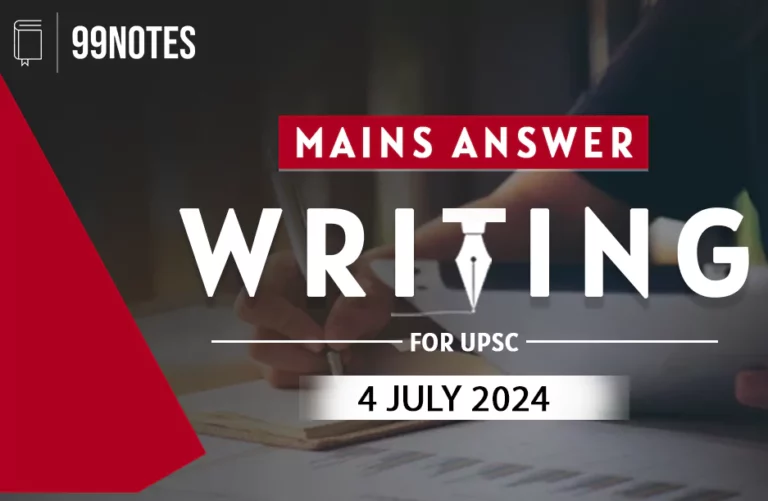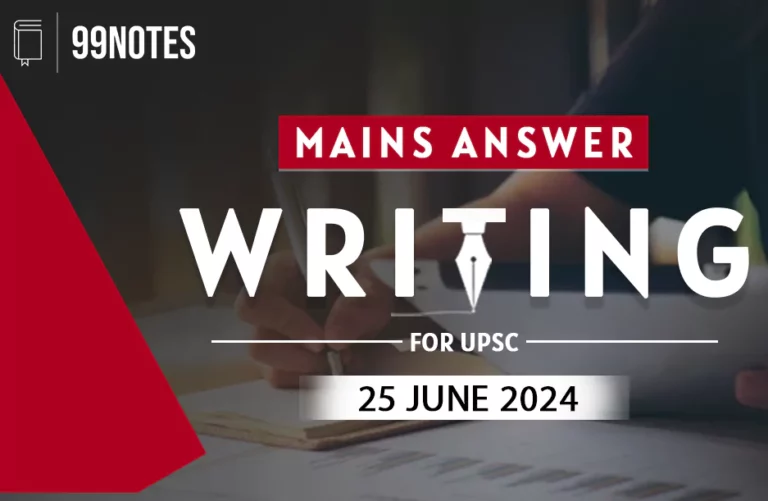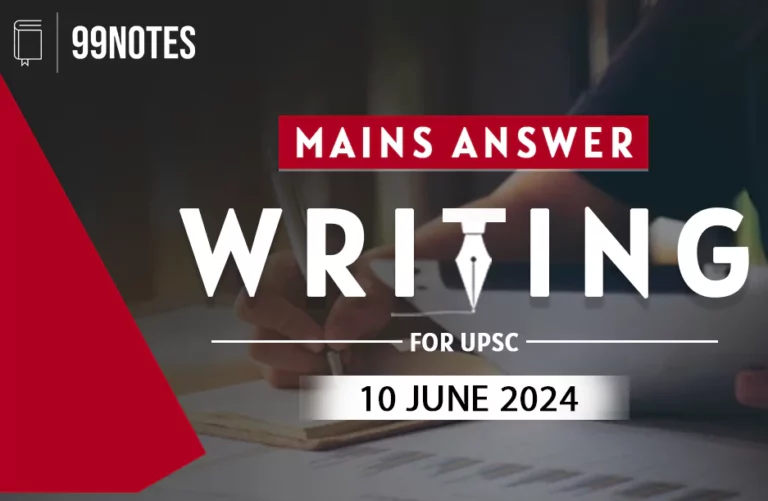9 Oct 2023 : Daily Answer Writing
Mains Answer Writing
9-october-2023
Q1) In light of the recent demands to amend the Indus Waters Treaty, discuss the possible implications it could have on the water-sharing mechanism between India and Pakistan.
ANSWER:
- As per the Indus Water Treaty (IWT) signed in 1960 between India and Pakistan all the waters of the Eastern Rivers, are allocated to India while the waters of the Western Rivers, are largely allocated to Pakistan. India being an upper basin nation, is allowed restricted usage of the Western Rivers to build run-of-the-river hydropower projects. However, the recent parliamentary panel has recommended the Indus Water Treaty be renegotiated in order to bring it in line with the current contemporary issues.
RENEGOTIATION OF THE IWT AND IMPLICATIONS ON WATER SHARING ARRANGEMENT BETWEEN INDIA AND PAKISTAN
- Meeting the Demands: Both India and Pakistan have failed to meet the water demands of their respective citizens due to archaic issues like prescriptive points in designing projects. This can be renegotiated in a manner to address the water demands of the people.
- Addressing the Impact of Climate Change: There have been changes in precipitation patterns, temperature, and frequency and severity of droughts and floods. Renegotiation of this treaty may help in mitigation and addressing the issues of climate change and improve the overall management of floods and other related disasters.
- Constant Disputes: In the last decade, the provisions of IWT have seen issues and disputes, especially with respect to the hydropower projects commissioned by India like Ratle and Kishanganga Projects. Amending the provisions of IWT can help to address these issues.
- To align the letter of the treaty with the spirit: Many technical criteria in the treaty no longer conform to the spirit of the treaty, that is to foster cooperation between India and Pakistan. The treaty is not equipped to cater to new techniques, technologies, and studies in order to increase life and efficiency.
- Strategic Nature: India has continued to adhere to the provisions of the IWT despite experts suggesting to use it as a strategic weapon against Pakistan’s terrorism. However, with the Balakot and Uri attacks, India’s stance has slightly hardened to using IWT as a tool for strategic diplomacy. For e.g., the PM calls for “water and blood cannot flow together”.
- International Law: The treaty misses on considering international rules of water sharing like the Helsinki Rules, Champion Rules, Berlin Rules, and United Nations Watercourses Convention which developed after the treaty. Renegotiation may give space to incorporate in principle the international laws for bilateral water sharing.
- Critical Situation of Pakistan: The state of Pakistan’s economy and strategic position is largely dependent on the IWT and its cooperative approach towards India. Therefore renegotiation also provides Pakistan a space to improve strategic ties with India while also helping it address important issues like floods, droughts, etc.
- Improve the Dispute Resolution Mechanism: The IWT has two dispute resolution mechanisms, Commissioners and Court of Arbitration. Both have failed to give desired results. Through negotiations, a new Neutral Expert may be brought into the picture to provide for a fair, equitable resolution to disputes in a technical and scientific manner.
- Rising Role of China: China has without any institutional participation become a party to IWT as Pakistan offers strategic support to China. China’s OBOR and CPEC projects utilize the waters. India is pushing for renegotiation in order to neutralize China’s involvement.
Any international treaty or agreement requires constant renegotiations and change in order to remain relevant across time. In this context, revisiting the IWT in the context of climate change, and changing dynamics of the Indo-Pakistan relationship is a prudent and necessary step.
Upload Answer here
2. What are the potential roles and applications of hydrogen in addressing India’s energy needs and environmental challenges? Discuss the opportunities and challenges associated with the integration of hydrogen into the country’s energy landscape.
Answer Will Upload Tomorrow at 12 PM….
Upload Answer here
3. Critically analyze the importance of the caste census as done in the state of Bihar, highlighting the issues it raises and the potential implications.
Answer Will Upload Tomorrow at 12 PM….
Upload Answer here
4. Discuss the causes, impact, and mitigation strategies for glacier-lake outburst floods (GLOFs) in the Himalayan region, with a focus on the recent GLOF event in Sikkim.
Answer Will Upload Tomorrow at 12 PM….
Upload Answer here
5. Critically analyze the key provisions and potential implications of the Digital India Act 2023 (DIA), highlighting the challenges and opportunities it presents for India’s digital ecosystem.
Answer Will Upload Tomorrow at 12 PM….
Upload Answer here
For Enquiry

10 Oct 2023 : Indian Express

10 Oct 2023 : PIB

10 October 2023 : Daily Current Affair

10 October 2023 : The Hindu Editorial Notes PDF

9 Oct 2023 : Daily Quiz

9 Oct 2023 : Daily Answer Writing

9 Oct 2023 : Indian Express

9 Oct 2023 : PIB

9 October 2023 : Daily Current Affair

9 October 2023 : The Hindu Editorial Notes PDF




